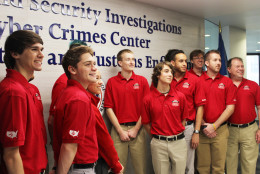Raytheon
-
Defense companies have spent a low percentage of their own funds on research and development, creating what some say is an innovation problem.
November 09, 2015 -
The Army is using simulations and virtual trainers to prepare its soldiers for everything from driving vehicles to shooting high-powered weapons, but at least one provider warns that it's time the Army rebooted its tools.
October 15, 2015 -
The Homeland Security Department picks Raytheon to run the DOMino program, which maintains and improves the intrusion protection and detection system known as EINSTEIN, and develops other cyber tools under the National Cybersecurity Protection System.
September 23, 2015 -
Lethal robots, plasmonic chips and nanoionics are just a few of the innovative advances working their way into everyday life. Randy Fort, Raytheon's director of programs and security, tells Executive Editor Jason Miller these real-world advances also have implications for federal agencies. They can mean cutting-edge intelligence and defense and streamlined manufacturing in the future.
September 02, 2015 -
Contractors, government relationship feeling the impact of cutting-edge technology, resulting in potentially cheaper and more efficient manufacturing.
September 01, 2015 -
From IT offices to law enforcement bureaus, the federal government says it needs more cybersecurity specialists. But competition is tough. Several federal agencies treated winners of the National Collegiate Cyber Defense Competition as VIPs when they visited Washington in late July. Stops on the tour included the National Security Agency, the Pentagon and the Cyber Crimes Center, part of Immigration and Customs Enforcement's Homeland Security Investigations. Listen to the full story by clicking the button below the slideshow.
August 06, 2015 -
The Army plans to say goodbye to more than 130,000 soldiers this year. To help troops move on with their lives the service is partnering with private employers who can provide job training. A new program will train some to enter the automotive industry. One of the partners is Raytheon. Lynn Dugle is president of Raytheon Intelligence, Information and Services. She joined Tom Temin and Emily Kopp on the Federal Drive to discuss the new program.
July 29, 2014 -
NSA, State and nearly every other agency are developing "fixes" to protect unauthorized employees from taking data. Experts say employees need to understand why the rules are in place and how they benefit both the organization and worker. OMB says one way to improve the situation is by reducing the number of federal employees with security clearances-an initiative that already is underway.
May 21, 2014 -
Paragon Dynamics is paying more than $1 million to settle claims that it stole a competitor's bid information.
September 06, 2012 -
The Army has awarded a contract for cyber maneuvering technology so that network administrators can stay a few steps ahead of hackers.
July 18, 2012 -
Three of the top five U.S. defense vendors — Northrop Grumman Corp., General Dynamics Corp. and Raytheon Co. — had lower sales in the first quarter of 2012, a trend that may continue as the Pentagon cuts its budget, according to a new report from Bloomberg Government.
May 23, 2012 -
Under the $40 million deal, ICE wants a modernized system that gives investigators access to more than 100 disparate databases.
November 15, 2011 -
Two senior senators will introduce an amendment to the DoD authorization bill to increase the oversight over the IT supply chain. A preliminary report from GAO finds counterfeit technology parts easily making their way into weapons systems.
November 09, 2011 -
he leaders of the Senate Armed Services Committee say counterfeit electronic parts, mostly from China, are flooding the supply chain for the Pentagon.
November 07, 2011 -
Raytheon to provide jam-proof communications for submarines, major surface ships and sites onshore, as well as connectivity with U.S. Army and Air Force communication systems.
June 17, 2011







